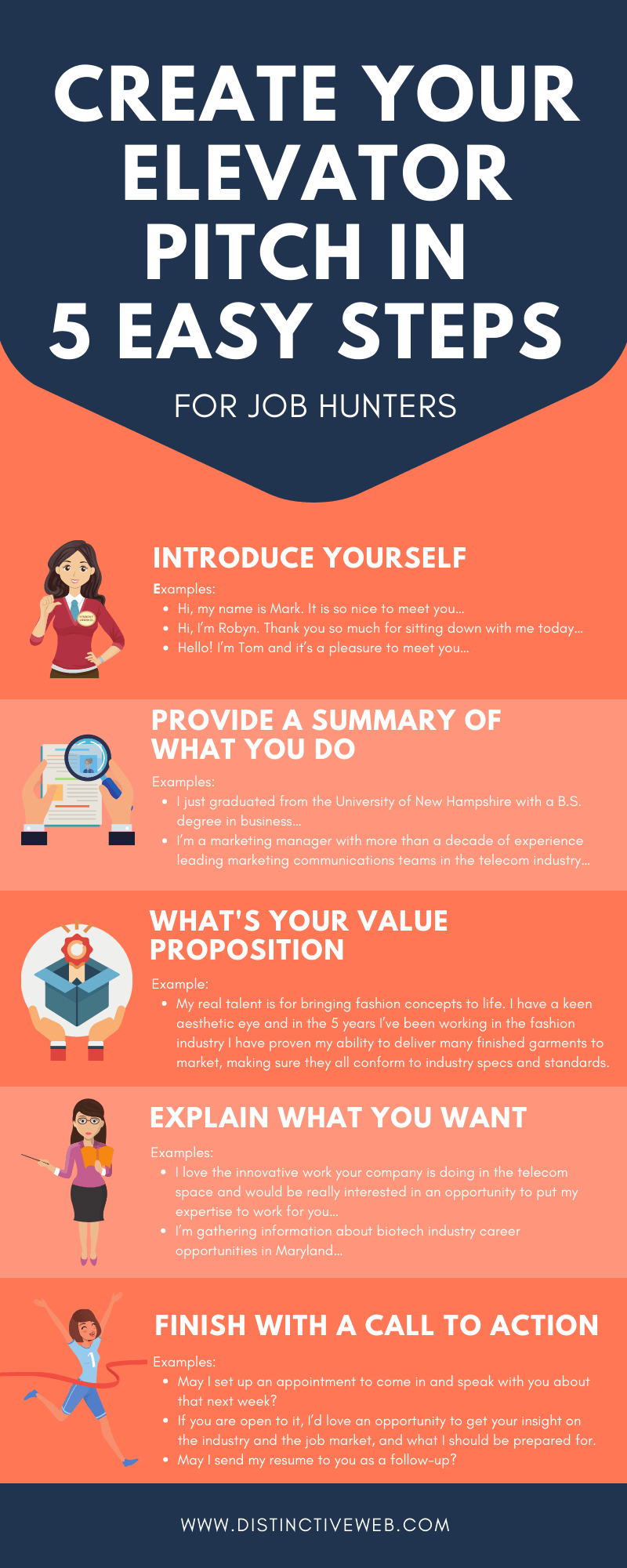
The elevator pitch aka elevator speech. You are probably familiar with the term. It is most commonly used to describe the concise 30-second speech that business owners and executives, as well as salespeople, use to describe their business, product, or service to others.
More importantly, it is a speech that is delivered in a compelling way that describes what is unique about the business (or offering), describes the benefits to the target market, and excites interest in the listener.
So, why should you–the job seeker and career professional–care about an elevator pitch? If you have ever stumbled over your answer when an interviewer or networking contact asks the all-too-familiar question “Tell me about yourself?”, you know why. You must have a good elevator speech ready for networking events and as an answer to interview questions.
If you are familiar with the concept of personal branding, and the idea of leveraging your brand to advance and promote yourself in your career, I’m sure you immediately recognized similarities between the above description of an elevator pitch and a personal brand statement.
Personal branding allows you to make a name for yourself. It differentiates you from your peers and helps to position you as a leader in your field – as a specialist and an authority who knows how to do a job and fill a particular niche in the workplace better than anyone else. A personal brand statement is a succinct statement that clarifies and communicates what makes you and your unique value proposition different and special.
Your personal brand statement will play a large role in your 30-second elevator pitch as a job seeker and career professional. Your entire elevator pitch will be a mini-presentation that you are able to give on the fly in response to those common questions “what do you do?” or “tell me about yourself?”
With precision-like focus, an effective elevator pitch will immediately convey to the listener who you are as a professional, and will do it in a way that addresses not only your unique value proposition but does so in a manner that addresses the concerns of your listener; similar to a sales pitch.
Of equal importance, while your pitch is planned and rehearsed, when you actually deliver it, it should sound completely natural and spontaneous, yet it should leave the listener with a lasting, positive, and memorable impression. You will use your elevator pitch frequently, in networking situations and during interviews.
Identifying Your Elevator Pitch Story
Once you recognize that crafting an elevator pitch is essential, you might feel daunted at the prospect of creating and perfecting one. Our 5-step elevator pitch template will help.
With some introspection and honest self-assessment, developing your elevator pitch does not have to be difficult. To get started, ask yourself these essential questions:
- What is the focus of your search? What is your job target?
- Who is the person/people most likely to make a hiring decision about you?
- What are the problems faced by your target audience?
- What is it that you are offering that would solve these problems?
- What is it that differentiates you and makes you different from your peers?
- What are the benefits of your work as experienced by your target audience?
To create your elevator pitch, you now must put these elements all together in a brief presentation that you can deliver quickly—in the time it would take you to get from one floor to the other in an elevator.
Seeing real elevator pitch examples can help as can following a step-by-step elevator pitch template.
A 4-Step Elevator Pitch Template
More Tips For Writing Your Elevator Pitch
- Invent multiple versions. Adapt your elevator pitch with important information relevant to a variety of circumstances. Be sure you have a version to talk to industry insiders as well as other professionals who are less familiar with your background.
- Rehearse carefully. Practice delivery of your elevator speech while looking in a mirror. Even better, record yourself. Talking out loud will help you determine if your speech sounds natural and will help you avoid speaking too fast.
- Invite feedback. Ask friends to let you practice on them. Use their suggestions and questions to make adjustments. You may need to speak more slowly or translate industry jargon into language that’s easier to understand.
- Stay up to date. Review your pitch on a regular basis. There may be keywords that grow stale over time and need to be replaced. Also, you may have earned new credentials that you want to include.
- Spend time listening. Watch for the other person’s reactions and listen to their comments. Ideally, you’ll open up a two-way conversation. Pick someone you admire and pay attention to the way they introduce themselves. It could give you some worthwhile ideas.
- Exude confidence. Start out with a firm handshake as long as it’s appropriate for the setting and situation. Radiate enthusiasm. Hold your head up high and smile. Make eye contact for a few seconds.
- Be prepared. You can use your speech for more than just job interviews. Keep it in mind when you’re at cocktail parties, soccer games, or the grocery store. It’s possible you’ll bump into someone who may have a lead on the kind of position you are seeking.
- Remember to follow up. Think of your pitch as the first step in a longer process. Hand out and collect business cards. Suggest getting together for coffee to continue a discussion.
Creating your elevator pitch may take some time and thought, but it is a wise career professional who invests in it! You will hear the “what do you do?” or “tell me about yourself?” questions over and over, both during your job search and throughout your entire career.
Don’t wing it! Preparation is the key to confidence and the key to making a lasting, positive, and memorable first impression. The benefits to your career will be phenomenal. It is well worth the effort! Put this 5-step elevator pitch template to use, study the elevator pitch examples, and take action today.










